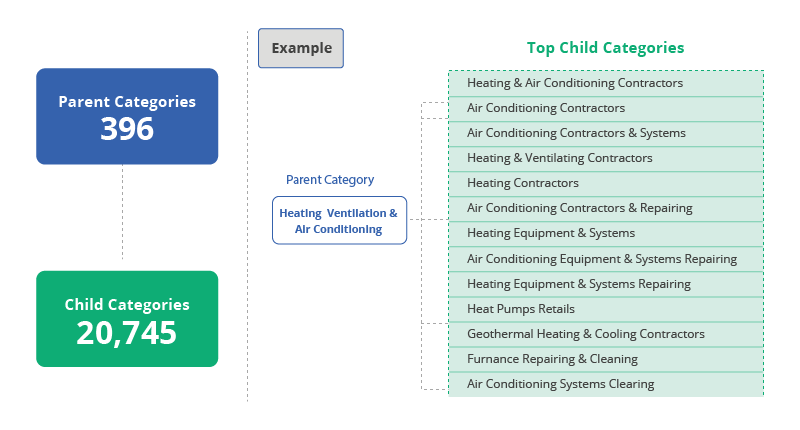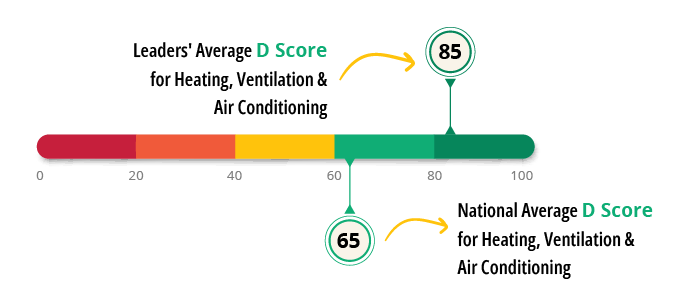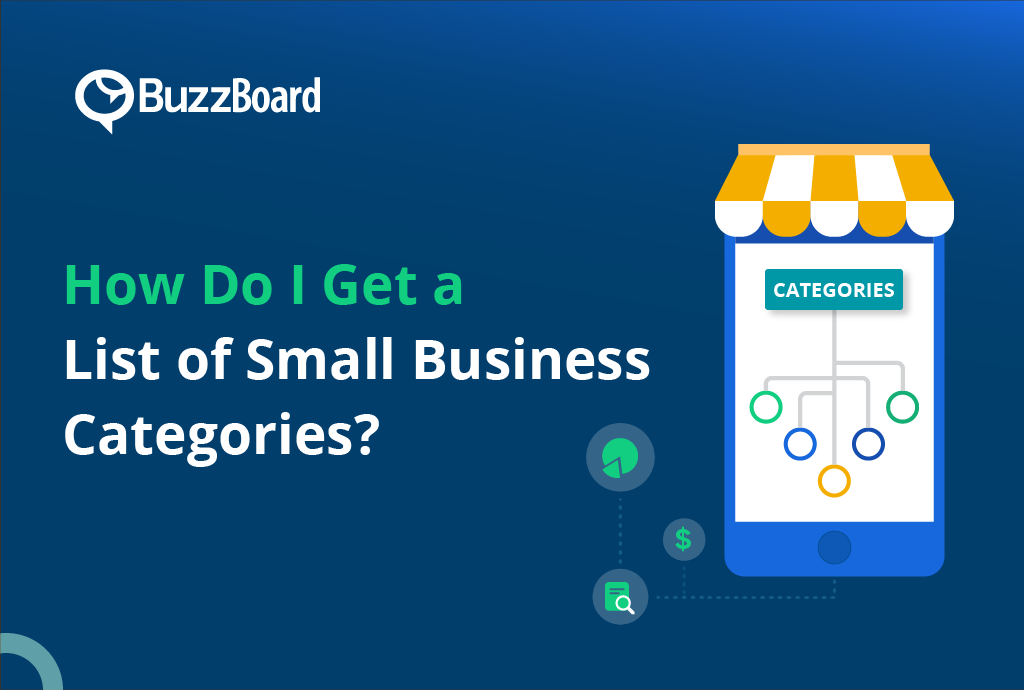Summary
Why Categorize Small Businesses?
- Understanding small business category classification is essential because it helps you tailor your sales and marketing efforts niched down to their specific needs.
- Business categories are instrumental in identifying new market trends, developing innovative products or services, and fostering a competitive edge.
- You should avoid the risks of inaccurate classification, which can include sub-optimal marketing strategies, data misinterpretation, and potential compliance issues.
How to Get a List of Small Business Categories?
To get a list of small business categories, consider these sources:
- Government classification systems like NAICS, SBA, and SIC.
- Business directories and platforms such as Google and LinkedIn.
- Advanced tools like BuzzBoard for micro-categorization.
How to Identify a Target Audience With Small Business Category Classification?
For sales professionals focused on selling to small businesses, classifications are not only crucial for identifying the unique characteristics of each business but also for developing targeted sales strategies. Unfortunately, NAICS and other standard industry classification systems, although are great starting points, can be too broad or too generic to provide accurate classification for small businesses. That’s why BuzzBoard offers a proprietary micro-category classification system that considers additional details specific to small businesses, ruling out all inaccuracies.
BuzzBoard’s AI-powered solution offers unparalleled accuracy in both classifying businesses and building target lists of businesses within a category, enabling hyper-targeted outreach with high personalization and ensuring more resonance with potential clients.
BuzzBoard is the only player in the market with a complete digiographic meta-intelligence on 30 million SMBs.
Exploring Small Business Categories
Business categories top the list of go-to data in the process of segmenting SMBs, and rightfully so. A comprehensive identification and breakdown of small businesses into categories can significantly benefit sellers and marketers across industries. This knowledge allows for better catering to the ever-changing needs of small and local businesses. Segmenting these businesses into specific categories makes it easier to shape successful client-centric strategies. Precisely, classifying small businesses allows for an immediate baseline to build marketing strategies tailored to clients’ specific requirements and desires. It can also enhance the sales pitch to potential clients by showcasing a thorough understanding of their business operations in the context of their industry.
At its most basic level, small businesses can be classified under these 4 broad category types:
- Retail businesses are arguably among the most common types of small businesses. They range from brick-and-mortar stores to online businesses, spanning numerous niches such as vintage boutiques, health food stores, and technology shops.
- Service-based businesses roll up to another significant broad category, including services like lawn care, house cleaning, consulting, and more. These services command a large demand that goes beyond households and extends to larger corporations.
- Production and manufacturing businesses fall under yet another category. These companies create and produce goods from raw materials, including small-scale food production, such as home-based bakeries or candy stores.
- Finally, there are hybrid businesses. They fall into multiple categories; restaurants could be considered service businesses and production businesses, as they produce food and provide a service by serving it.
Using Industry Standards to Categorize Small Businesses
In the small business world, industry standards play a vital role in categorizing diverse enterprises into predefined groups, which are essential for understanding the business landscape. These classifications are not only crucial for identifying the unique characteristics of each business but also for developing effective sales strategies, be it for those selling digital marketing solutions or business productivity solutions to small businesses.
As sales professionals focused on selling to small businesses, it is crucial to develop a deep understanding of the diverse range of small businesses and their unique needs to tailor your approach effectively. With the vast array of small business categories, having reliable sources to compile this data is essential for creating targeted marketing strategies that resonate with your target audience.
Traditional Sources for Compiling a List of Small Business Types
Government resources, such as the North American Industry Classification System (NAICS), can be invaluable in identifying small business classifications. NAICS is a comprehensive system that provides exhaustive information on different industries and the types of businesses within them. By utilizing NAICS, you can gain a deeper understanding of the various industries and sectors, allowing you to tailor your marketing approach to specific niches.
Consider exploring other resources such as the Small Business Administration (SBA) and the Bureau of Labor Statistics (BLS). These organizations provide valuable data and insights on small businesses, including industry trends, growth rates, and demographic information.
Another useful resource is the Standard Industrial Classification (SIC) system, which categorizes industries via a four-digit code. This platform offers a wide range of categories, making it an excellent tool for creating a more comprehensive map of your target small business customers.
NAICS and other standard industry classification systems, although are great starting points, can be too broad or too general to provide accurate classification for small businesses.
Beyond government classification systems, other valuable sources include business directories, and platforms, like Google and LinkedIn. These platforms allow businesses to self-report categories, making them effective for gathering niche industry data. Businesses self-report on their categories when they claim their Google Business Profile as it is an important ranking factor for local searches. As of 2024, there are over 4,000 Google categories available for businesses to choose from.
LinkedIn can be a great source for understanding industry trends and connecting with potential clients within specific sectors.
Even so, in all these cases, their categorizations can be too much work at times to provide an accurate classification for small businesses—let alone their imprecise nature!
To address these inadequacies, BuzzBoard’s proprietary data offers a far more detailed and accurate business classification, breaking down SMBs into micro-categories for enhanced segmentation.
BuzzBoard offers a proprietary micro-category classification system that considers additional details specific to small businesses. It is built to true up the inaccuracies found in other standard industry classification systems.
BuzzBoard’s proprietary URL finder, together with AI/ML-powered category identification logic identifies and matches SMBs to about 400 parent categories that in turn map to over 20,000 child categories.
This means you can start your search at a broad category level, and BuzzBoard’s data platform will break down your search to give you a view of all possible (accurate and highly granular) sub-categories along with the count of businesses in each. With BuzzBoard, you can quickly drill down to the level you want and add the most relevant prospects—by category micro-classification—into your funnel and to your campaigns.

BuzzBoard lets you get as granular as you desire into hyper-targeted campaigns and personalization with its small business micro-category classification, enabling you to tailor your campaigns, sales and marketing messages for better performance and resonance.
Stay up-to-date with the latest trends and insights within the categories you operate in, and you can position your agency as a trusted partner for small businesses, helping them navigate the complex digital marketing landscape and achieve their goals. To assist you in staying current, BuzzBoard publishes category benchmark reports that surface digital-maturity category averages at the national level that are often very helpful in getting your current and future clients to pay attention.

Different Business, Different Needs: How Small Business Category Classification Influence Marketing and Sales Approaches
There exist various types of small businesses, each with distinct needs, demands, and market trends. Prospecting against broad categories can cause inaccurate targeting, wasted marketing spend, and missed opportunities.
In simpler terms, one of the primary reasons why understanding small business categorizations is essential is that it allows vendors to identify their target audience with precision and tailor their sales and marketing efforts accordingly. For instance, a software development firm, a boutique café, or a neighborhood mom-and-pop store are vastly different entities, and each has unique needs and challenges that require distinct approaches. The software development firm may require specialized digital marketing solutions to capture leads and increase signups, whereas the boutique café or the mom-and-pop store may require more localized marketing efforts to attract foot traffic, such as online reviews management and directory listings.
In addition to identifying target audiences and developing effective marketing strategies, understanding small business categorizations can also help vendors anticipate the growth dynamics of each sector. For instance, a business that caters to a rapidly growing industry, such as healthcare technology, may require more aggressive marketing efforts to keep pace with the competition. On the other hand, a business that caters to a mature industry, such as traditional retail, may require more focused efforts on customer retention and loyalty.
The ideal level of niching down while classifying small businesses depends on your specific marketing and sales goals. You may want to start with broader categories and target a larger base if you’re just getting started with your research. On the other hand, If you have a well-defined target audience or a niche marketing strategy, using sub-categories can help you tailor your message more effectively.
For example, if you’re selling marketing software, you might categorize businesses by industry (e.g., retail, healthcare) at first. But then you could delve deeper into sub-categories (e.g., clothing stores, dentists) to create more targeted marketing campaigns.
Do remember, accurate business classification results in data-driven decision-making, tailored solutions, and optimized marketing strategies that ensure business growth and success.
Optimizing Campaigns With AI-Powered SMB Micro-Category Classification
In a digital marketing milieu increasingly governed by big data, the ability to niche down your sales and marketing efforts is indispensable. This notion is particularly vital when applying small business categories for more targeted outreach.
To maximize the utility of small business classifications for your targeted marketing efforts, consider utilizing them in your CRM systems. These platforms can provide rich data and insights to power your marketing ventures, drawing connections between categories and deciphering patterns in purchasing behaviors.
Final Thoughts
While standard classification systems provide a good starting point, they often fall short when it comes to the detailed targeting necessary for small businesses. BuzzBoard’s AI-powered solution offers unparalleled accuracy in both classifying businesses and building target lists of businesses within a category, allowing for hyper-targeted campaigns and improved marketing performance.
Remember, it all boils down to the best available account data. You can get your CRM and marketing automation platforms updated with BuzzBoard, which outperforms other data providers in identifying sub-categories for small businesses. This is particularly useful when segmenting down to a specific product level and tailoring your outreach messages with pinpoint accuracy.









